About the Journal
The magazine Nuevo Derecho (ND) is a publication of the Faculty of Legal and Political Sciences of the University Institution of Envigado. It has a biannual periodicity, which generates as a result two publications a year. The journal is aimed at researchers, teachers, students and others belonging to the academic community who have an interest in the socio-legal field.
The objective of the Nuevo Derecho journal is to create a space for the publication of articles, research results, reflection articles, review articles and reviews that contribute significantly to the academic discussions of the law and to those debates that draw an analysis between the law and the law. sociology, philosophy, political science, cultural studies, gender studies, and with the social sciences in general.
The journal has an open and permanent call under a free subject, however, the invitation to special Dossier-type editions can be presented that integrates subjects directed to a specific theme or a specific object of study.
The contents of the Nuevo Derecho magazine are open access through the web platform.
PEER EVALUATION PROCESS
Evaluation process
The articles must be sent through the OJS platform. The receipt of the article in the journal does not signify its approval.
All articles received are subject to an editorial process that takes place in several phases. The articles that have been received will be reviewed by the journal editor who will estimate the relevance of the text in accordance with the focus and scope established by the publication, in turn verifying its originality through the iThenticate software and finally making a review regarding formal shipping requirements. The result of the software for the analysis of similarity of texts and plagiarism will be communicated to the author (s) with their respective diagnosis before defining any behavior of malpractice in order to request the corresponding comments from the author regarding the case, accordingly. , The decision to continue the article in the editorial process rests with the editor of the magazine.
On the other hand, once it has been established that the article meets the thematic and formal requirements demanded by the journal, it will be sent to two academic peers, which will be made under the "double blind" review system in order to avoid all type of conflict of interest and must be done from the OJS platform. For the review process of each edition, the Nuevo Derecho journal will invite external peers from the institution to be part of the review and evaluation of the articles.
The academic peers will have a period of 30 days to issue the evaluation, a time that may be extended at the express request of the evaluator. In the event that there is rejection by one of the peer evaluators and an acceptance by another of the peer evaluators, a third evaluation will be requested under the same modality of the "double blind" system.
Communications with peer reviewers and authors will be made from the OJS platform.
The peer reviewers must make their opinion filling out the formats established by the Nuevo Derecho magazine for this purpose. The authors can suggest possible reviewers, however, the final decision on the referees will be made by the Journal Editor. The peer reviewers will consider the following aspects of the submitted articles:
Consistency in the title, objectives, hypothesis, method, results and discussion in the presented study.
Relevance of the theoretical foundation.
Writing quality.
Actuality and relevance of the bibliography.
Follow-up of citation standards (APA).
Originality of the study and importance of contributions to the respective field of knowledge.
The result of the evaluation can be: 1) Publish without changes; 2) Publish with modifications and 3) Reject.
In the event that the evaluating peer issues "Publish with modifications" as a result, it must attach with the evaluation format, a copy of the evaluated text with the comments where the aspects to be modified are clearly exposed. In case adjustments to the article are required, the corrected version must be returned by the author to the journal in no more than 15 days.
Once the writing is accepted by peers for publication, the editing process begins, including review of style, writing and other formal aspects. Throughout the process, the editor maintains communication with the submitting author in order to request required adjustments and advise on the editorial process.
Once the respective number is published, the communication is issued to all participating authors.
Open access policy
The Nuevo Derecho (ND) journal follows the Open Access model in which the contents of scientific publications are available in full text, free and free on the Internet, therefore, this journal does not charge any value to the authors for the submission, editing, or publication of the manuscript, and in turn undertakes to disseminate the works published in Open Access indexing services.
The opinions contained in the articles are the responsibility of their authors.
The magazine Nuevo Derecho (ND) authorizes the reproduction of articles as long as the source is mentioned.
ETHICAL PUBLICATION RULES
Declaration and submission
Articles submitted for publication must be original texts. Along with the issuance of the article by the author and through the OJS platform, a letter of submission and assignment of rights must be attached stating the originality and authorship of the text, which indicates that the article has not been previously published and that nor has it been sent simultaneously to another magazine or broadcast medium. The authors with this letter are granting the Nuevo Derecho journal the right for their article and materials to be reproduced, published, edited, communicated and publicly transmitted in any form or medium, as well as their distribution in the number of copies required and its public communication, including its making available to the national and international public through electronic means, exclusively for scientific, cultural and dissemination purposes, and for non-profit purposes.
It is necessary to bear in mind that the study from which the manuscript is derived must have the informed consents for all participants and the support of the institutional ethics committee. The foregoing should be specified in the methodology section, as well as the respective references in case of having data or tests provided or designed by other authors.
The letter of submission and assignment of rights where the letter stating the originality and authorship of the text is declared must be sent in accordance with the format established by the magazine. All authors must have read and agree with the content of this document, as well as the letter must contain the signature of all the authors.
The respective authors of the article are responsible for the content of the text and their effective participation as authors of the presented text.
Authorship
The Nuevo Derecho journal, based on the four criteria assumed by the International Committee of Medical Journal Editors (ICMJE), assumes the following definition of the author of a scientific article:
Make substantial contributions to the conception or design of the article or the acquisition, analysis and interpretation of data for the work.
The writing of the article or the critical review of its content.
Final approval of the version to publish.
Be responsible for all aspects of the work, ensuring that all questions regarding the accuracy or completeness of the text are investigated and confirmed.
Only those who meet these 4 criteria can appear as authors of a scientific article. The foregoing implies that all co-authors have a shared responsibility for the entire work as a whole, relying on confidence in the integrity of contributions from their collaborators. Contributors to the article who do not meet these 4 criteria cannot appear as authors, but must be recognized, indicating their names and the respective contribution made for the purposes of the investigation or completion of the article at the bottom of the page.
It is the collective responsibility of the authors, and not the journal, to determine that all persons named as authors meet the four criteria. The same authors of the article in mutual responsibility decide the order of their appearance in the article according to the importance of their respective contributions. Along with the article to the journal, an article submission form is sent, where the authors (if there are more than one), present their data in the established order, for which they are responsible.
If the authors request the removal or addition of an author after submission or publication of the manuscript, the journal will request a signed statement of agreement for the requested change from all authors mentioned and the author must be removed or added.
Plagiarism
Plagiarism is a fairly broad phenomenon and can range from the absence of bibliographic references, to the use of other people's ideas, both published and unpublished, without their consent, to the presentation of a complete document with a different authorship in another idiom. To avoid plagiarism, all sources must be appropriately cited according to APA standards, and when the use of a large amount of someone else's written material or illustrations is required, permission should be sought. Procedures and tests used in the investigation, which are created by other people, must be explicitly cited in the article. If plagiarism is detected in an article, it is immediately withdrawn from its evaluation, editing or publication process and a letter is sent to the authors with presentation of evidence.
Retraction
The retractions are made due to voluntary or involuntary errors of the authors; however, whatever the cause, the corrective actions are the same for both. Authors have the right to manifest and spontaneous retraction of the partial or total content of their manuscripts at any time. The communication in which you withdraw must be sufficiently explicit. It does not exclude the authors of disciplinary or legal actions derived from errors in the articles



